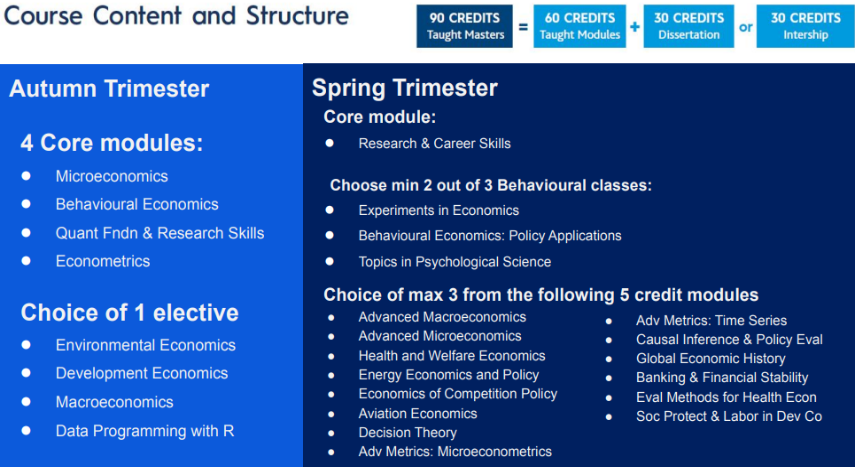MSc in Behavioural Economics
MSc in Behavioural Economics
Learn how to use behavioural tools to understand economic decision-making
Applications for the 2025/26 are accepted on a rolling basis from October 1st and will close on 31st of August 2025.
For information on fees and how to apply, please click here.We offer a number of scholarships/fee waivers, including one full fee waiver to the student with the highest GPA admitted to our MSc in Behavioural Economics.UCD and EU students are eligible for this scholarship. For more information, please check here.
The MSc in Behavioural Economics provides comprehensive training at the interplay of economics and psychology that allows you to gain the knowledge, skills, and tools to understand human decision-making. These behavioural insights are highly sought-after skills in the private and public sectors, as well as in international organizations. Businesses increasingly employ behavioural economics to understand their customers, while public institutions and international organizations use experimental methodologies to design more effective policy interventions. The skills you will gain in the Behavioural Economics MSc will help you stand out in a world where employers seek to better understand individual and collective decision-making.

The MSc Behavioural Economics is the only one of its kind in Ireland and one of the few worldwide with a strong policy and regulatory focus. You will join Ireland’s leading economics department and a vibrant team of behavioural researchers and practitioners. We will provide you with in-depth training in the core concepts and theories of behavioural economics, as well as a range of empirical methods used to test ideas in laboratory and field experiments. You will obtain training in running experimental studies and will have access to the (opens in a new window)BSP lab, the only experimental economics laboratory in Ireland. Your training covers not only the fundamentals of behavioural economics but also the ethical, legal, and regulatory context for the ideas of behavioural economics. Thus, you will be equipped to apply these ideas in a wide range of academic, business, and policy settings.
Students will also become members of the UCD Behavioural Science and Policy Group based in the Geary Institute for Public Policy. The Group holds regular interdisciplinary seminars and an annual conference where students have the opportunity to interact with leading researchers and policymakers in this field.
Behavioural Economics Video Gallery
Career Opportunities
Graduates of our masters programmes move to jobs in central banks, think-tanks, government departments, regulatory agencies, financial sector institutions and consultancy firms.
Some have also gone on to complete PhDs in economics and pursue successful careers as academic or research economists. Past employers of MSc in Behavioural Economics graduates include: Behavioural Insights Team, Irish Government Economic and Evaluation Service (IGEES), Central Bank of Ireland, Economic and Social Research Institute, Competition and Consumer Protection Commission, KPMG, Accenture, Indecon, and other leading national and international organizations and companies.

Students will take a range of rigorous economic modules, studying cutting-edge research on human decision-making. Through assignments, students have the opportunity to design and run their own behavioural experiments. Masters students are an integral part of our School community, attending research seminars and receiving a wide range of supports to help them prepare for their research thesis or internship. More details on the various modules and what you will learn: here
Entry Requirements
- A primary degree with at least an upper second class honours or international equivalent in Economics or in a degree in which Economics is a major component
OR
- An upper second class honours in a Higher Diploma in Economics or in the MSc Qualifier.
- Applicants whose first language is not English must also demonstrate English language proficiency. A full list of the Minimum English Language Requirements can be found here
- For scholarships/fee waivers please check here and here
Programme Coordinator Dr Oana Peia (opens in a new window)oana.peia@ucd.ie

The MSc provides such a variety of modules while being taught by some of the best in the industry.


